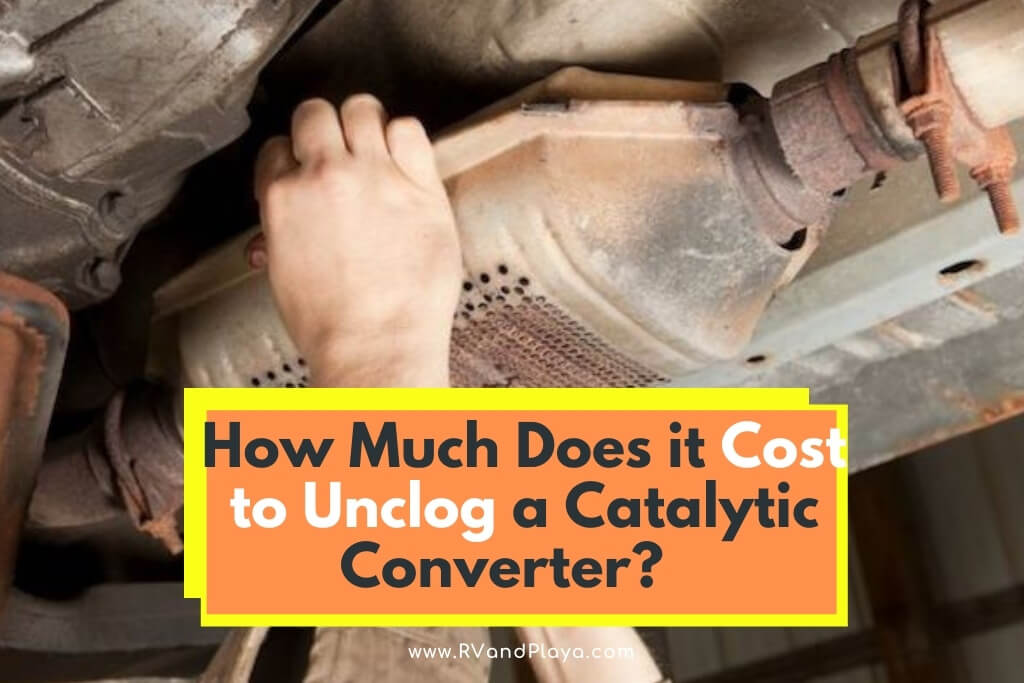Have you ever asked yourself how much does it cost to replace or unclog a catalytic converter? Well, you are at the perfect place to find the answer to such a question.
You might find your car is suddenly heavier of fuel, or you encounter an unpleasant smell and smoke coming from your exhaust.
The problem may well be your catalytic convertor is passed its sell-by date. If your catalytic is lightly clogged, you may use a catalytic cleaner that costs around $20. However, a damaged catalytic can not be repaired, and you will need to replace it.
So, how much does it cost to unclog a catalytic converter? It will cost you between $435 to $2,600 to replace your clogged catalytic convertor. Aftermarket catalytic converters range between $300 to $800, and OEM converters range between $500-$2,000. Factor in labour at 1.5 to 4 hrs at $90-$150 per hour.
You cant repair a catalytic converter that has reached its lifespan, and replacement is the only practical option.
If you are wondering if you need to replace your catalytic and how much it costs, here are some of the facts explained.
Table of Contents
How Much Does it Cost To Unclog a Catalytic Converter?
If you simply want to clean a lightly clogged catalytic, you may buy a cleaner such as Seafoam or Cataclean for around $8 to $20. However, if your catalytic is damaged and at the end of its lifespan you can not repair the part, you will have to replace your converter.
There is no getting around the fact that catalytic converters are expensive. Catalytics contain three different platinum group metals, palladium, platinum and rhodium.
In an average modern catalytic, you can expect to find about 3 to 7 grams of platinum, but this may vary according to the vehicle manufacturer and the model of the car.
If you are on a budget and go the aftermarket part route, be aware that non-OEM parts have a considerably shorter lifespan than Original Equipment Manufacturer parts. Aftermarket converters range between $300 to $800, while OEMs range between $500-$2,000, depending on make and model.
Mechanics range from $90 to $150 an hour, so your labour will range between $135 and $600.
The average catalytic replacement cost is around $1,000, according to the Orange County Sheriff’s Department. They released this average price due to the enormous increase in catalytic converter theft in the USA.
The Los Angeles County Sheriff’s Department reported that converter thefts increased 400% in 2020 alone.
Read also: How to Clean a Catalytic Converter With Seafoam (Best Tips)
What is a Catalytic Converter?
A catalytic converter is an exhaust emission management device that transforms harmful gases in exhaust gas into less harmful emissions through a system of chemical reactions.
Typically a catalytic converter has a honeycomb core coated with rare metal catalysts such as rhodium platinum and palladium.
These rare elements heat up as the exhaust gas passes over them and create a chemical reaction transforming toxic pollutants into less toxic equivalents. Catalytic converters are designed to reduce:
- Nitrogen oxides such a NO and NO² which go by the collective name NO🇽
- Hydrocarbons and volatile organic compounds or VOCs causes by unburned fuel
- Carbon monoxide or CO, a toxic gas.
A catalytic converter has two kinds of catalysts within its structure: a reduction catalyst and an oxidation catalyst.
The reduction catalyst grabs NO and NO2 molecules as they pass over the palladium and rhodium, and the atoms bind with the nitrogen atoms on the catalyst to form N2.
The oxidation catalyst burns (oxidises) the unburned hydrocarbons and carbon monoxides as they move over the platinum and palladium catalyst.
Most cars manufactured after 1996 are the three-way catalytic converters that refer to the three regulated emissions it helps reduce.
Most modern OBDII equipped vehicles have O2 sensors in the exhaust system both before and after the catalysing converter to ensure proper functioning.
Read also: Can a Catalytic Converter Unclog Itself? (Clear a Clogged)
What Causes a Catalytic Convertor to Clog?
There are several reasons why your catalytic converter may be clogged, and you should determine the underlying issue before cleaning or replacing your converter.
A catalytic converter has no moving parts and works automatically, so it shouldn’t have problems unless it is close to the end of its lifespan of around ten years.
The most common issues leading to a clogged converter are:
- Faulty oxygen sensors. Modern cars have oxygen sensors to monitor the vehicles oxygen levels to ensure peak operation. If one of the sensors is defective or has a bad connection overheating may damage your converter.
- Impact damage. Converters should last at least 100,000 miles without any issue unless they suffer an impact such as hitting a curb or a large rock. This impact may cause the matrix inside to fracture and deteriorate.
- A Leaking Fuel Injector. A leaking fuel injector may send too much unburned fuel into the exhaust, which causes an increase in temperature. This temperature spike may burn or melt the converter matrix.
- Water Damage. Driving through a deep puddle may damage your converter due to the rapid cooling within the matrix, causing it to fracture.
What Are the Signs of a Clogged Catalytic Converter?
Most modern cars have an on board diagnostic or OBD that will send an error code if there is an issue with your catalytic converter.
Typically the system will alert the driver with the code P0240 code will alert the driver with “Catalyst System Efficiency Below Threshold.” Other signs your converter is not functioning are :
- Increased fuel consumption
- Loss of performance and power
- Decreased acceleration
- Hard starts
- A rattling sound under your car
- Rotten egg smell of sulphur
- Increased smoke exiting from your car exhaust.
Do Catalytic Convertor Cleaners Work?
Although catalytic converter cleaners may help with symptoms or general maintenance, they won’t repair a failing converter.
If your converter has reached the stage that you receive an error code, the wise option will be to have the part replaced, especially if the convertor is nearing the end of its lifespan.
Opinions are divided on the efficacy of cleaners such as Seafoam or Cataclean, which is EPA approved.
Still, the more sensible option seems to find the underlying issue and address it. Even if that means a costly replacement, at most, these cleaners will buy you some time before the inevitable replacement.
Read also: How to Clean a Catalytic Converter With Seafoam (Best Tips)
How Long Does a Catalytic Converter Last?
Your OEM catalytic converter should last the lifespan of your vehicle or, on average, 100,000 miles (160,934 kilometres.) However, this estimate is contingent on several variables, including:
Adverse weather conditions can decrease your catalytic converters lifespan and frequent driving on and sand or salted road surfaces.
The condition of your engine. If your fuel/air mixture is not correctly balanced, you will decrease the lifespan of your converter.
Too much air causes pollutants not to burn up entirely and adhere to the catalyst. Too much fuel generates excessive heat in the exhaust and may burn the catalyst.
Engine maintenance and Tuning. Vehicle owners that perform stringent maintenance and repairs and perform regular tune-ups and fuel injection cleaning will extend the life of their converters.
Conclusion
It is illegal to operate a vehicle in the USA without a functioning catalytic converter, so it’s best to address the issue as it arises.
Unfortunately, until all cars run entirely on electric power, there will come a time when you need to replace your converter.
If your converter is clogged or damaged, it’s time to get a new one.
Here are some of my favorite tools & equipment´s
Thank you for reading this article. I hope it helps you find the most recent and accurate technical and repair information for your car. Here are some tools that I use as an automotive technician and hope you´ll also find helpful.
There are affiliate links, so if you do decide to use any of them, I´ll earn a small commission. But in all honesty, these are the exact tools that I use and recommend to everyone, even my own family. (NO CRAP)
To see all my of most up-to-date recommendations, check out this resource that I made for you!
References
https://en.wikipedia.org/wiki/
https://auto.howstuffworks.com/
Recent Posts
Can A Clogged Catalytic Converter Cause A Misfire (Faulty Converter Code)
Engine misfires are often caused by spark plugs and other ignition parts, but sometimes, a misfire can be caused by other reasons, such as a clogged catalytic converter. Because clogged catalytic...
How To Check If Your Catalytic Converter Is Bad (6 Common Problems)
Have you ever wondered how to check if your catalytic converter is bad? Look no more. We´ve got you covered. The Catalytic Converter is a vital component of a vehicle because it reduces bad...


